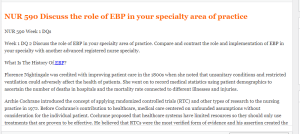NUR 590 Discuss the role of EBP in your specialty area of practice
NUR 590 Discuss the role of EBP in your specialty area of practice
NUR 590 Week 1 DQs
Week 1 DQ 2 Discuss the role of EBP in your specialty area of practice. Compare and contrast the role and implementation of EBP in your specialty with another advanced registered nurse specialty.
What Is The History Of EBP?
Florence Nightingale was credited with improving patient care in the 1800s when she noted that unsanitary conditions and restricted ventilation could adversely affect the health of patients. She went on to record medical statistics using patient demographics to ascertain the number of deaths in hospitals and the mortality rate connected to different illnesses and injuries.
Archie Cochrane introduced the concept of applying randomized controlled trials (RTC) and other types of research to the nursing practice in 1972. Before Cochrane’s contribution to healthcare, medical care centered on unfounded assumptions without consideration for the individual patient. Cochrane proposed that healthcare systems have limited resources so they should only use treatments that are proven to be effective. He believed that RTCs were the most verified form of evidence and his assertion created the foundation for the EBP movement.
Click here to ORDER NOW FOR AN ORIGINAL PAPER ON: NUR 590 Discuss the role of EBP in your specialty area of practice
In 1996 David Sackett introduced the term evidence-based medicine along with a definition that is still widely used today. Unlike

Cochrane, Sackett felt that EBP should not only focus on research but should merge evidence, clinical experience and patient values. As other healthcare professions began adopting Sackett’s concept for patient care, it was renamed evidenced-based practice.
EBP is an essential component of safe, quality patient care. Nurses must be aware of current practices in order to provide care to patients with complicated and debilitating conditions.
Nursing students in an RN to BSN program learn the role of research in the nursing practice. These programs cover the design, methodologies, process and ethical principles of research. In addition, nursing students use critical thinking skills to evaluate and critique research studies in order to apply the findings to their nursing practice.
NUR 590 Discuss the role of EBP in your specialty area of practice Grading Rubric Guidelines
| Performance Category | 10 | 9 | 8 | 4 | 0 |
| Scholarliness
Demonstrates achievement of scholarly inquiry for professional and academic decisions. |
|
|
|
|
|
| Performance Category | 10 | 9 | 8 | 4 | 0 |
| Application of Course Knowledge –
Demonstrate the ability to analyze, synthesize, and/or apply principles and concepts learned in the course lesson and outside readings and relate them to real-life professional situations |
|
|
|
|
|
| Performance Category | 5 | 4 | 3 | 2 | 0 |
| Interactive Dialogue
Replies to each graded thread topic posted by the course instructor, by Wednesday, 11:59 p.m. MT, of each week, and posts a minimum of two times in each graded thread, on separate days. (5 points possible per graded thread) |
|
Summarizes what was learned from the lesson, readings, and other student posts for the week. |
|
|
|
| Minus 1 Point | Minus 2 Point | Minus 3 Point | Minus 4 Point | Minus 5 Point | |
| Grammar, Syntax, APA
Note: if there are only a few errors in these criteria, please note this for the student in as an area for improvement. If the student does not make the needed corrections in upcoming weeks, then points should be deducted. Points deducted for improper grammar, syntax and APA style of writing. The source of information is the APA Manual 6th Edition |
|
|
|
|
|
| 0 points lost | -5 points lost | ||||
| Total Participation Requirements
per discussion thread |
The student answers the threaded discussion question or topic on one day and posts a second response on another day. | The student does not meet the minimum requirement of two postings on two different days | |||
| Early Participation Requirement
per discussion thread |
The student must provide a substantive answer to the graded discussion question(s) or topic(s), posted by the course instructor (not a response to a peer), by Wednesday, 11:59 p.m. MT of each week. | The student does not meet the requirement of a substantive response to the stated question or topic by Wednesday at 11:59 pm MT. |

